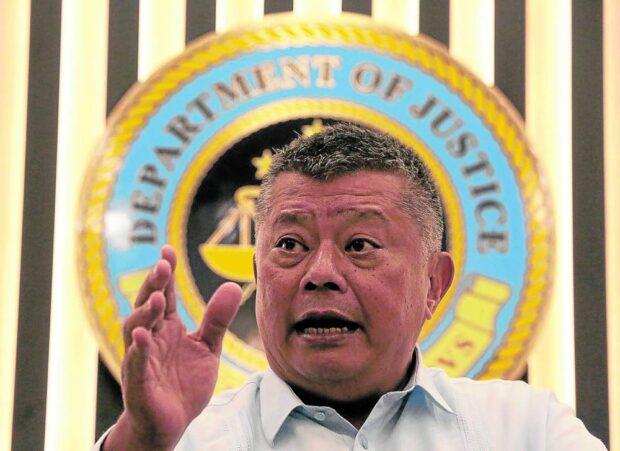DOJ chief Remulla to ICC: Keep off PH territory or it will be a mess

FILE PHOTO: Justice Secretary Jesus Crispin “Boying” Remulla. INQUIRER FILES
MANILA, Philippines — Department of Justice (DOJ) Secretary Jesus Crispin Remulla on Wednesday opposed the decision of the International Criminal Court (ICC), denouncing it as a stark symbol of a return to colonialism.
He said the ICC’s action, denying the Philippine government’s appeal against its investigation into the country’s brutal anti-drug campaign, means meddling with the Philippines’ justice system.
Remulla’s pronouncements come as the DOJ issued a statement expressing “deep disappointment” and “strong disagreement’ with the ICC ruling.
READ: ICC junks PH plea to stop probe into deaths linked to war vs drugs
Article continues after this advertisement“Hindi tayo pwede magpasakop sa mga taong nais pakialaman ang sistemang hustisya na gumagana naman sa ating bansa. Kaya ang pakikialam sa ating bansa ng mga banyagang ito ay para bang senyales din na gusto nilang bumalik sa colonialism, na hinding hindi tayo papayag,” he said during a press conference.
Article continues after this advertisement(We cannot submit to people who want to tamper with the justice system that works in our country. So these foreigners’ interference in our country also indicates they want to return to colonialism, which we will never allow.)
He reiterated that the Philippines will no longer coordinate with the ICC. He even warned the ICC that if they tried to enter the country, it would be “usurpation of authority of the Philippine government” – hence, a violation of Philippine laws.
“Kung gusto nila tayo sakupin talagang magkakagulo … no conditions ‘yan, respect our sovereignty or else,” he added.
(If they want to occupy us, it will be a mess… no conditions, respect our sovereignty or else.)
READ: PH disappointed: ICC disregards sovereign right to investigate serious crimes
Echoing the sentiments of the Office of the Solicitor General, the DOJ said that the ICC decision disregards the principle of complementarity under international law and “undermines the sovereignty of the Philippines.” The DOJ asserted anew that the ICC has no jurisdiction over the country.
“The ICC’s rejection of our appeal is based on a flawed interpretation of its own jurisdiction. It fails to acknowledge that the Philippines has a functioning and capable domestic legal system that is fully capable of investigating and prosecuting crimes within its jurisdiction,” it said in a statement.
“The principle of complementarity, enshrined in the Rome Statute, recognizes the primary jurisdiction of national courts to prosecute crimes and ensures that the ICC only intervenes when national authorities are unable or unwilling to do so,” it added.
READ: ICC not welcome if it pushes drug war probe
The DOJ renewed its commitment to pursuing justice and accountability and defending the sovereignty and integrity of the country’s legal system.
It urged the ICC to “reconsider its decision and recognize the Philippines’ unwavering commitment to the rule of law and the pursuit of justice.”
Dissenting vote proves PH on right track
At the press conference, Remulla highlighted that the two contrary opinions of ICC judges on the ruling that denied the Philippines’ appeal prove that the country truly has a solid basis for its stance.
“Hindi naman tayo nagugulat sa sinasabi ng ICC. Natutuwa nga tayo na itong desisyon na ito hindi suportado ng lahat naroroon sa ICC. Sa limang ‘yan tatlo sumuporta dalawa ang kumontra– isang bagay na nagsasabi na nasa tamang landas tayo ng pagiisip tungkol sa sovereignty ng Pilipinas, na hindi tayo pwede magpasakop sa mga taong nais pakialaman ang sistemang hustisya na gumagana naman sa ating bansa,” said Remulla.
(We are not surprised by what the ICC is saying. We are glad that everyone at the ICC did not support this decision. Out of those five, three supported and two opposed – something that says that we are on the right path of thinking about the sovereignty of the Philippines, that we cannot submit to people who want to tamper with the justice system that works in our country.)
READ: ICC ruling ‘a step toward justice’ for EJK victims – rights groups
When Remulla was asked to comment about the ICC’s assertion in its ruling that only four incidents of abuses were addressed by the Philippine government, the DOJ chief claimed it was an “error in judgment.”
“Error in judgment ‘yan. Ang legal system natin relies on evidence. We look for evidence whenever we move. Hindi tayo pwedeng manisi ng tao ng wala tayong ebidensiya na pwedeng iharap laban sa mga naakusahan,” said Remulla.
(That’s an error in judgment. Our legal system relies on evidence. We look for evidence whenever we move. We cannot just blame people when we have no evidence to present against the accused.)
RELATED STORIES
Hontiveros presses PH anew to cooperate with ICC probe into killings under Duterte
NUPL: Drug war victims, families ready to cooperate with ICC probe
Bato dela Rosa eyes reelection despite controversial ICC ‘drug war’ probe